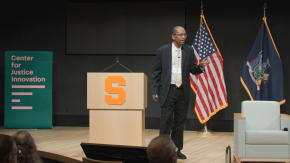
By building effective, people-centered practices in veterans treatment courts across the country, we can strengthen networks of support for our veterans to keep them in their communities and connected to the services they need.
"How can we best serve those who have served us and are coming through our court system?"
That question was at the heart of a recent summit that focused on transforming how veterans encounter our criminal justice system. Judges, attorneys, veterans, and clinicians gathered at the National Veterans Resource Center in Syracuse, New York, to learn from each other’s work supporting former service members in veterans treatment courts.
More than half of veterans involved in the criminal justice system struggle with substance use or mental health challenges. Veterans who have post-traumatic stress disorder—often related to their military service—are 61 percent more likely to come into contact with the system.
For others, contact with the system follows from economic hardships associated with life after service. Nearly a third of incarcerated veterans have experienced homelessness—roughly five times the rate of the general population.
Veterans treatment courts were designed to address the unique needs of former service members coming into the justice system. Instead of incarceration, these courts offer veterans a pathway to meaningful support and treatment in the community.
Today, there are more than 500 such courts operating across the country. Besides community-based resources like substance use and mental health treatment, many of them also provide peer mentorship, giving participants a chance to connect with other veterans who have experienced the challenges of adjusting to life after military service.
Our Recovery and Reform team works around the country to help veterans courts and other treatment courts improve the way they respond to substance use, trauma, and the wide range of challenges that might lead up to an arrest. The team has worked with ten states across the political spectrum—from California to Arkansas to Ohio and beyond—to help assess their needs, identify priorities for change, and create statewide action plans for strengthening their veterans treatment courts.
In some states, making sure veterans courts reach the people who need them most stood out as a key challenge. Others, like Maine, struggled to recruit peer mentors to bring an added level of trust and support for veterans navigating the system.
At the Veterans Treatment Court Summit our Recovery and Reform team hosted in Syracuse, practitioners from many of the states the team has worked with came back to exchange lessons and experiences. Discussions ranged from the impact of trauma and acquired brain injuries on justice-involved veterans to the work of advancing racial equity in veterans courts.
For those who attended—social workers, judges, outreach specialists, lawyers, and more—it was a valuable opportunity to learn what other communities are doing to tackle similar problems and better support veterans in the justice system.
“It’s important to serve veterans because they served us,” said Sergeant Major Gregory Coker, founder of the Reaching New Heights Foundation. “And I think they’re an underserved population that has lots of challenges when they come back.”
As with so many others who come into our courts, contact with the justice system is often the latest in a long list of challenges veterans face, from mental and behavioral health issues to housing insecurity. By building effective, people-centered practices in veterans courts across the country, we can strengthen networks of support for our veterans to keep them in their communities and connected to the services they need.

